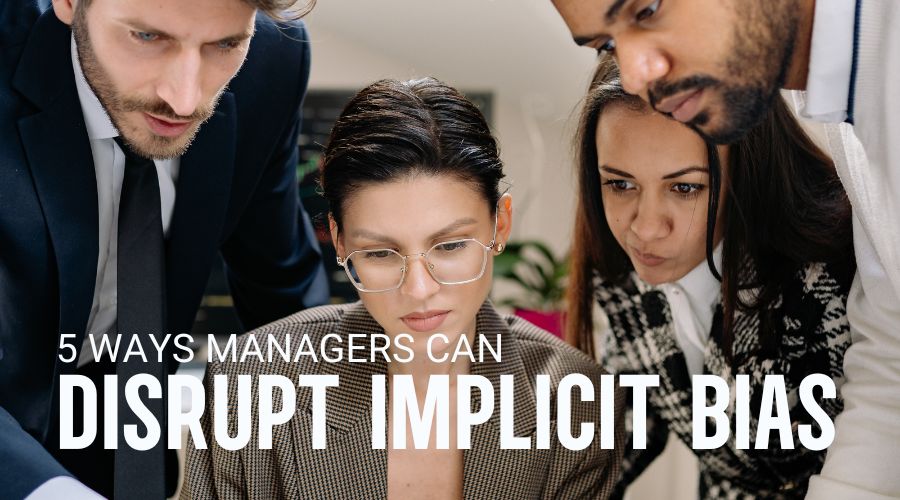It’s subtle.
You don’t even know it’s there.
Yet, implicit bias affects workplaces around the globe.
In today’s diverse and interconnected world, it’s crucial for managers to skillfully navigate the complex landscape of implicit bias.
In this blog post, I summarize the insights I gleaned from a conversation I had with Dr. Dejon Davis, my partner and colleague at The Leadership Strength Group.
Dr. Davis has trained thousands of leaders across multiple disciplines, and implicit bias is just one topic he covers.
What is Implicit Bias?
Dr. Davis explained that implicit bias refers to the unconscious attitudes and stereotypes that influence our perceptions and decision-making processes.
What Can Managers Do to Mitigate Bias in Their Decisions?
By delving into the origins of implicit bias and understanding its underlying mechanisms, you can promote a bias-free and psychologically safe workplace.
5 Ways to Disrupt Implicit Bias
Here are five ways you can disrupt implicit bias in the workplace.
#1 – Delve into the Neurology of Implicit Bias
Start by delving into the origins of implicit bias and unravelling the underlying mechanisms. This gets into the “why” of implicit bias and helps you understand the invisible triggers so you can consciously manage them.
Research shows that biases form through associative memory and implicit cognitions. Our brains create associations between concepts based on repeated experiences and cultural influences. These associations then influence our unconscious biases, affecting our thoughts, behaviors, and decision-making processes.
Without awareness of these unconscious biases, our judgement can become clouded and lead to unfair decisions impacting distributive, procedural, and interactional justice.
By understanding this process, managers can recognize their own biases and work towards creating fair workplaces.
#2 – Recognize Microaggressions and Respond with Empathy
Microaggressions are subtle behaviors or comments that perpetuate bias and contribute to a toxic work environment. Recognizing and addressing microaggressions is a crucial step in creating a culture of respect and inclusivity.
Thus, it’s vital to develop strategies that promote empathy, understanding, and open dialogue. By acknowledging and validating the experiences of individuals who face microaggressions, you can create an environment where everyone feels valued, heard, and respected.
#3 – Engage Employees to Mitigate Implicit Bias
Active engagement plays a pivotal role in mitigating implicit bias within the workplace.
Encourage open discussions, active listening, and diverse perspectives to challenge and dismantle biases. In doing so, you’ll empower employees to share their experiences, thoughts, and ideas without fear of judgment or discrimination.
Harnessing the power of engagement enables you to foster an environment where everyone’s contributions are appreciated, ultimately mitigating the influence of implicit bias.
#4 – Launch Anti-Bias Strategies
To disrupt the cycle of implicit bias, apply concrete strategies and interventions within your managerial role with the guidance of human resources. Here are three ideas to get you started:
- Assess your policies and procedures for bias.
- Provide implicit bias awareness and prevention training.
- Implement diverse hiring panels.
- Promote and inclusive decision-making processes.
By promoting bias awareness and mitigation strategies, you create an organizational culture that overcomes implicit bias.
#5 – Become a Change-Maker
As an influential leader, you have the power to become a change-maker. Assess your policies, procedures, and systems to promote equal access to resources, opportunities, and your time.
When you lead by example, you inspire your workforce to embrace workplace fairness, respect, and appreciation for others.
By understanding the underpinnings of implicit bias, you can mitigate its impact and disrupt the cycle.
Want to Disrupt Implicit Bias in Your Workplace?
Join our next live online class.
sylvia melena

SYLVIA MELENA is a Principal at The Leadership Strength Group, a leadership and organizational development consulting firm. She is also the international award-winning and best-selling author of Supportive Accountability: How to Inspire People and Improve Performance and its Spanish translation, Responsabilidad solidaria.







